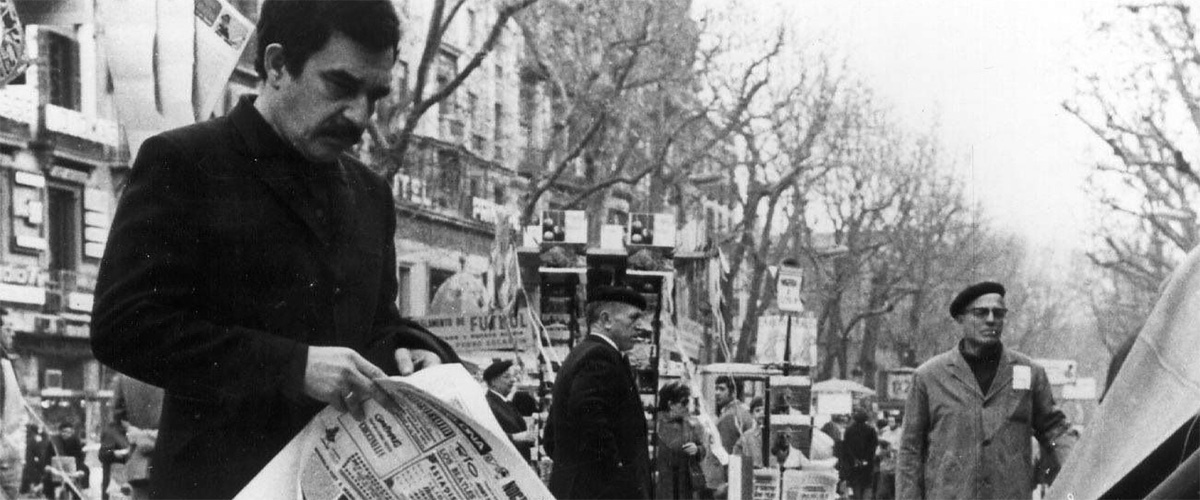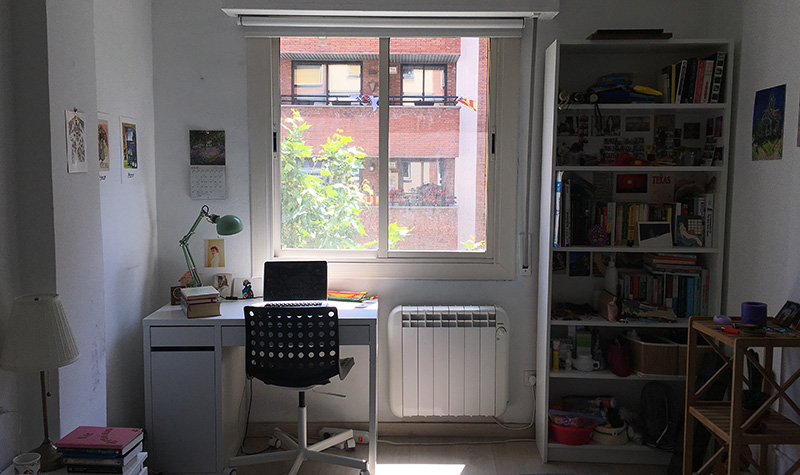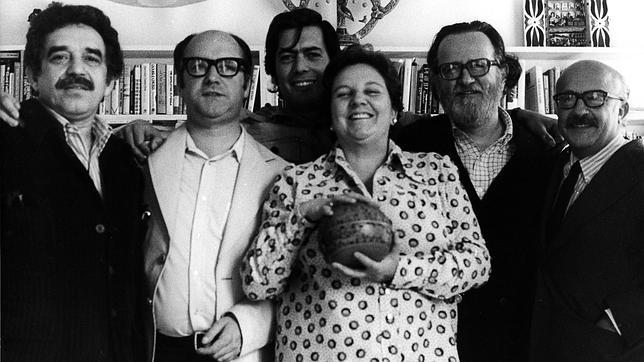 |
| García Márquez in Barcelona |
Living With
Gabriel García
Márquez’s Ghost
When You Discover Gabo Once Inhabited Your Barcelona Apartment
Lucia BenavicesJune 12, 2018
It wasn’t until a year after moving into my Barcelona apartment that I learned Gabriel García Márquez once lived here too.
It was early March, on what would have been his 91st birthday. A journalist friend was doing research for a piece about the years García Márquez spent in Barcelona when she came across an old 2014 article that mentioned the two homes he lived in during his time here. My phone buzzed with the news.
The first thing I felt was Gabo’s presence. Of course, I was looking for it; as a writer constantly narrating her own life, searching for intangible stories behind what’s physically around me, I wanted to think of the place as haunted by Gabo’s ghost. In less horror-movie terms, I wanted to believe my room was touched by some kind of magic that would seep into my own writing. I wanted to let it inspire me, use it as an excuse to channel the muses I had already felt throughout my life, in the other, less enchanted places I had lived.
But then Gabo crossed the line.
Some days after finding out the news, I woke up in the middle of the night to what I thought was the sound of my bedroom door opening. When I opened my eyes, the door was shut. It must have been very early in the morning; it was still dark outside, but the heaviness in my chest made me think I had been sleeping for many hours. Then I heard, outside my room, the closing of another door—an office my roommate uses—and footsteps.
The next morning, both roommates swore they had slept the whole night through.
Whether the footsteps had been real or just confirmation bias, one thing was clear: Gabo was here to stay.
Gabriel García Márquez moved to Barcelona in 1967 with his wife Mercedes and two young sons, Rodrigo and Gonzalo. He would spend seven years in the Catalan capital. It was where he wrote The Autumn of the Patriarch, a novel about the life of an archetypical Caribbean dictator; or as Gabo himself described it, a “poem on the solitude of power.” Some months before his move, One Hundred Years of Solitude had been published in South America to huge acclaim, and he gained quick celebrity status there. Once in Spain, where the book hadn’t yet been published, that success allowed him, for the first time in his career, to focus exclusively on being a full-time writer.
Fifty years later, in 2017, I moved to Barcelona, not with a partner and children, but on my own. I hadn’t published Latin America’s most critically acclaimed novel or introduced a new kind of literary genre into the mainstream, but I did come with a similar purpose: to be a full-time journalist.
And by a stroke of writer’s luck, or perhaps some higher guidance from the universe, I landed in the same exact spot where Gabo spent the first year in Barcelona on the Avinguda de la República Argentina, down to the unit.
The first thing that drew me to the apartment had been the street’s name. I’m originally from Argentina, and when I saw the ad in the Spanish version of Craigslist, I thought: It’s a sign. It was the very first place I looked at—after hearing multiple times that it would take weeks to find a decent room for a decent price—and immediately, I knew it was the one. The room I would rent was full of natural light, bigger than my previous room in the States, and it had a huge window overlooking the main avenue. The place wasn’t fully furnished yet, but it didn’t take much to imagine a desk underneath that window, where I would spend hours reading and dreaming and writing.
 The author’s room. Photo by Lucia Benavides.
The author’s room. Photo by Lucia Benavides.
At the time, I had no idea that another writer had once had the same vision. Xavi Ayén, journalist at the Catalan newspaper La Vanguardia, got to speak with Gabo in 2005 as research for his book Aquellos años del Boom, which chronicles the story of Latin American writers in Barcelona during the 1960s and ‘70s. He confirmed, to no surprise of mine or anyone who’s read his work, that García Márquez believed in spirits and the supernatural, and in the power of homes and their histories. Ayén also told me that it’s very likely Gabo started writing Autumn of the Patriarch in the very room from which I’m writing this story now.
“I’m sure that he would believe that something of his presence and what he wrote there stayed behind in the spirit of the apartment,” said Ayén. “There’s no doubt about it.”
Awarded the Nobel Prize for Literature in 1982, Gabriel García Márquez is best known as the father of magical realism and most famous for One Hundred Years of Solitude and Love in the Time of Cholera. But he was more than just a novelist. He was a politically active “committed Leftist” who surrounded himself with revolutionaries like Fidel Castro and anti-fascist comrades in Spain. He was also a journalist, and continued writing articles even after achieving success as a fiction writer.
“It’s very likely Gabo started writing Autumn of the Patriarch in the very room from which I’m writing this story now.”
He covered the Cuban revolution in the 1950s. He wrote about a Colombian naval shipwreck that exposed a military scandal and caused a national uproar. And perhaps most relatable to me—an obsessive Beatles fan—he published an obituary for John Lennon after his murder in 1980. In it, he said that Lucy in the Sky with Diamonds, for which I’m named, was one of Lennon’s most beautiful songs.
Before he died, García Márquez founded a nonprofit organization that invests in and supports Spanish-speaking journalists. (Another coincidence: I looked up The Gabriel García Márquez New Journalism Foundation, and the website’s front page featured a photo of three journalists that included a former professor of mine.) When I asked Ayén if Gabo would have liked for a journalist to live in his old home, he responded with a distinctly Spanish expression, “Hombre, sí.” Of course.
García Márquez was the first of a string of Latin American writers to arrive in Barcelona in the late 1960s, a time in literary history known today as the Latin American Boom. The majority of these writers—including Mario Vargas Llosa, José Donoso and Julio Cortázar—were brought to Barcelona by Carmen Balcells, a Catalan literary agent who is credited with changing the face of publishing in the Spanish-speaking world. (Cortázar actually lived in Paris, but visited Barcelona often.) Once in Spain, the market for the authors’ work expanded; suddenly they had access to all of Europe, and not just the Spanish-speaking countries.
Leticia Escario and her husband Luis Feduchi found themselves in the middle of this literary storm. The Spanish couple, she a psychologist and he a psychiatrist, met Gabo and Mercedes at a dinner organized by a mutual friend during their first months in Barcelona. They instantly hit it off, and the friendship proved to be an important one in Gabo’s life; the couples kept in touch throughout the decades and often visited each other.
“It was a joy to listen to him tell stories,” Escario said when I met her for coffee on a rainy spring morning. “Both speaking and writing, he was enchanting.”
One of the first things I asked her, as I kept pinching myself that the woman in front of me was one of Gabo’s best friends, was if she’d ever visited his—now my—apartment on Avinguda Argentina. Escario said no; they didn’t know each other well yet during his time there, and she doesn’t think Gabo and Mercedes had many people over that first year. But she does remember dropping them off in front of the apartment the night they met.
“García Márquez once decided against buying a house simply because he claimed it was haunted. I wondered, then, if he’d refrain from haunting mine.”
“We stayed chatting in the car and decided to meet the next day for lunch with the kids,” said Escario, who had daughters the same age as Gabo’s sons. “But we never went up.”
Even Gacía Márquez’s biographer, Gerald Martin, knows little of his time on Avinguda Argentina. After various email exchanges and a lengthy Skype conversation, Martin—who had only ever seen my apartment from the street—visited the place, in hopes of also “sensing Gabo,” during a work trip to Barcelona.
Over tea in the same living room where Gabo once sat, possibly also drinking tea with his family, Martin told me about the years he spent with García Márquez while writing his biography, Gabriel García Márquez: A Life. He met with Gabo all over the world: in Colombia, in Mexico, and once in Cuba, where he also met Fidel Castro.
“He was incredibly intuitive,” said Martin. “He could really read people.” And he was superstitious: García Márquez once decided against buying a house simply because he claimed it was haunted. I wondered, then, if he’d refrain from haunting mine.
The news about García Márquez originally threw me into an investigation frenzy: What was his life like in my apartment? What did he think and write and dream up while he was here? Did he watch the same tree outside my bedroom window lose its leaves in the autumn, only to watch them grow again in the spring?
Yet beyond meeting Leticia Escario and Gerald Martin, my questioning into his life at my apartment didn’t lead to much.
I know he lived here from November 1967 to February 1969—a little more than a year. I know the place was too small for he and Mercedes to have company over. None of the people I spoke with remembered visiting the apartment, none of my current neighbors were around 50 years ago, and there are no photos, to my knowledge, of his time here.
The owners of the various cafés in my neighborhood—places full of old men reading newspapers in dark corners and people catching up over beers—looked at me with blank stares when I asked if they know about Gabo ever visiting their joint.
“Did you know he lived just up the street?” I asked, pointing out the window.
They shrugged and frowned, saying they’d never heard such a thing. And besides, they would add, the oldest bar on the street has been around for just 33 years. The only café that could have led to any revelations is a neighborhood staple that closed this past October after more than 80 years. Even then, the owner’s father had passed away; his son would barely remember the years García Márquez lived just two buildings away.
“What was his life like in my apartment? What did he think and write and dream up while he was here? Did he watch the same tree outside my bedroom window lose its leaves in the autumn, only to watch them grow again in the spring?”
But while my neighborhood seems to have erased him from its collective memory, leaving only a faint ghost for those who come searching, in the nearby neighborhood of Sarrià, stories about him still circle the air.
Gabo moved to Sarrià in 1969 with his family and spent the rest of his time in Barcelona there until heading off to Mexico City in 1974. Sarrià is an upscale, village-like neighborhood that still maintains the feel of an independent town—it was annexed by Barcelona in 1921—with its windy narrow streets, outdoor cafés and old stone plazas. Being there felt like being transported to another time, another world. Every time I stepped off the bus, I found myself immersed in Gabo’s peak Barcelona years.
 Gabriel García Márquez with Jorge Edwards, Mario Vargas Llosa, José Donoso, y Ricardo Muñoz Suay and literary agent Carmen Balcells.
Gabriel García Márquez with Jorge Edwards, Mario Vargas Llosa, José Donoso, y Ricardo Muñoz Suay and literary agent Carmen Balcells.
Luis Miguel Palomares, literary agent Carmen Balcell’s son, grew up visiting Gabo’s apartment in Sarrià on an almost daily basis with his mother.
“I remember every corner of that house, I can tell you about every single detail,” he said from his office in downtown Barcelona. After his mother’s death in 2015, Palomares took over the Carmen Balcells Literary Agency, which continues to represent writers like Vargas Llosa and Isabel Allende. “We would go to the Gabos’ house, and I would play with Rodrigo and Gonzalo.”
Throughout our conversation, Palomares often referred to García Márquez as “uncle Gabo.” He spoke of him tenderly, saying he was very generous and affectionate; Palomares inherited many things from Gabo, including his first camera and his first car. He said he grew up surrounded not only by García Márquez, but the whole group of authors that would spend hours talking politics and ideals.
“Mother of God, what a privilege,” Palomares said. “In only listening to those conversations it would have sufficed. Even before I turned 16, from so many conversations, I had many degrees already.”
Today, Gabo’s apartment building in Sarrià looks much the same as it did then. It’s a small, five-story structure with a front yard at the corner of two quiet pedestrian streets. I wanted to talk to its current resident, who I had heard was an Oceanographer, someone who spends more time underwater than on land, like a character dreamed up from a García Márquez novel. I was curious: Did he feel inspired by his space too? Did he hear or see anything supernatural? Did he wonder if, perhaps, it was no coincidence that he ended up where García Márquez once lived?
I stood outside the building, not sure which apartment number to buzz, when an older woman with a cane began walking up the ramp. I asked her how long she’d lived there, and she replied with, “I’m 81 years old, and I’ve lived too long to remember.” I wasn’t quite sure if she meant in this world or in this apartment. Soon enough, another neighbor joined the conversation—neither of them knew where exactly García Márquez had lived, but they both had heard stories of him “coming around these parts.”
I never did get to talk to the current resident, but a few blocks from the apartment, I found the newsstand where Gabo frequently bought paper for his typewriter. The store’s new owner told me Gabo helped the previous owners set up the shop when he first moved into the neighborhood. The place is small, cramped with books and journals. On the right-hand wall hangs a huge black-and-white portrait of García Márquez, as if he were the country’s king or some kind of religious leader.
In theory, the place should hold some kind of magic—on top of García Márquez’s strolls, Las Ramblas has a rich history of revolutions, riots, and other writers, like George Orwell, spending significant time there. But as I walked past group after group of tourists stopping in front of me to take photos of Las Ramblas, I began to question my former romanticism. Maybe places have nothing to do with the people who inhabited them, who spent time inside them, who walked on their grounds.
Since I found out Gabo once lived where I live today, every mustached middle-aged man I pass on the streets of Barcelona is, for a split-second, him. Yet before learning of my apartment’s history, I would have never looked twice.
“I can choose believe it, or I cannot. So what’s the difference?”
The same goes for the stories my two roommates and I now tell about our apartment. After that first night, when Gabo tried to open my bedroom door, the elevator in our building stopped working—but only on our floor. Our elderly neighbor got stuck inside for several minutes until the firefighters came and helped her out. The building’s maintenance crew came to repair it a number of times, but the elevator kept getting stuck. Again, only on the fourth floor. (Needless to say, I still take the stairs, just in case.) Another night, after the elevator was finally fixed, my roommate woke us screaming with night terrors.
If all this had happened months ago, I wouldn’t have put the stories together, trying desperately to weave a coherent narrative. It is, in all likelihood, part of my tendency to see life as if someone were writing these events from another plane. To find themes and motifs and foreshadowing. To insert the ghost of a writer in my apartment.
Gabo’s energy may be there, in an inexplicable way physicists haven’t yet figured out (I’m counting down the seconds until my physicist brother messages me, arguing against this). Or it may not be. I can choose believe it, or I cannot. So what’s the difference?
Nothing changes, in the end; my room continues being a four-walled white square with an Argentine flag and a window overlooking a street of the same name. The only thing that changes is my perspective. As long as I feel Gabo there, he is there, at least through my eyes and my experience. I like stories, after all. And what’s a better story than the ghost of García Márquez in my room?
Lucia Benavides is a journalist and writer based in Barcelona, working as a regular contributor for NPR from Spain. Her work has appeared in various publications, including PRI’s The World, The Atlantic and L.A. Review of Books. Originally from Argentina, she was raised in Texas from a young age.



No comments:
Post a Comment